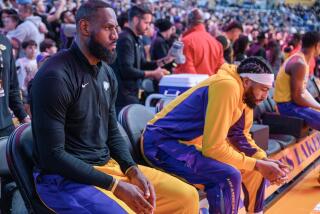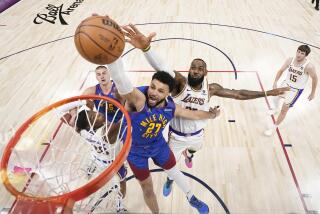50 years ago: Lakers win record-setting 33rd game in a row
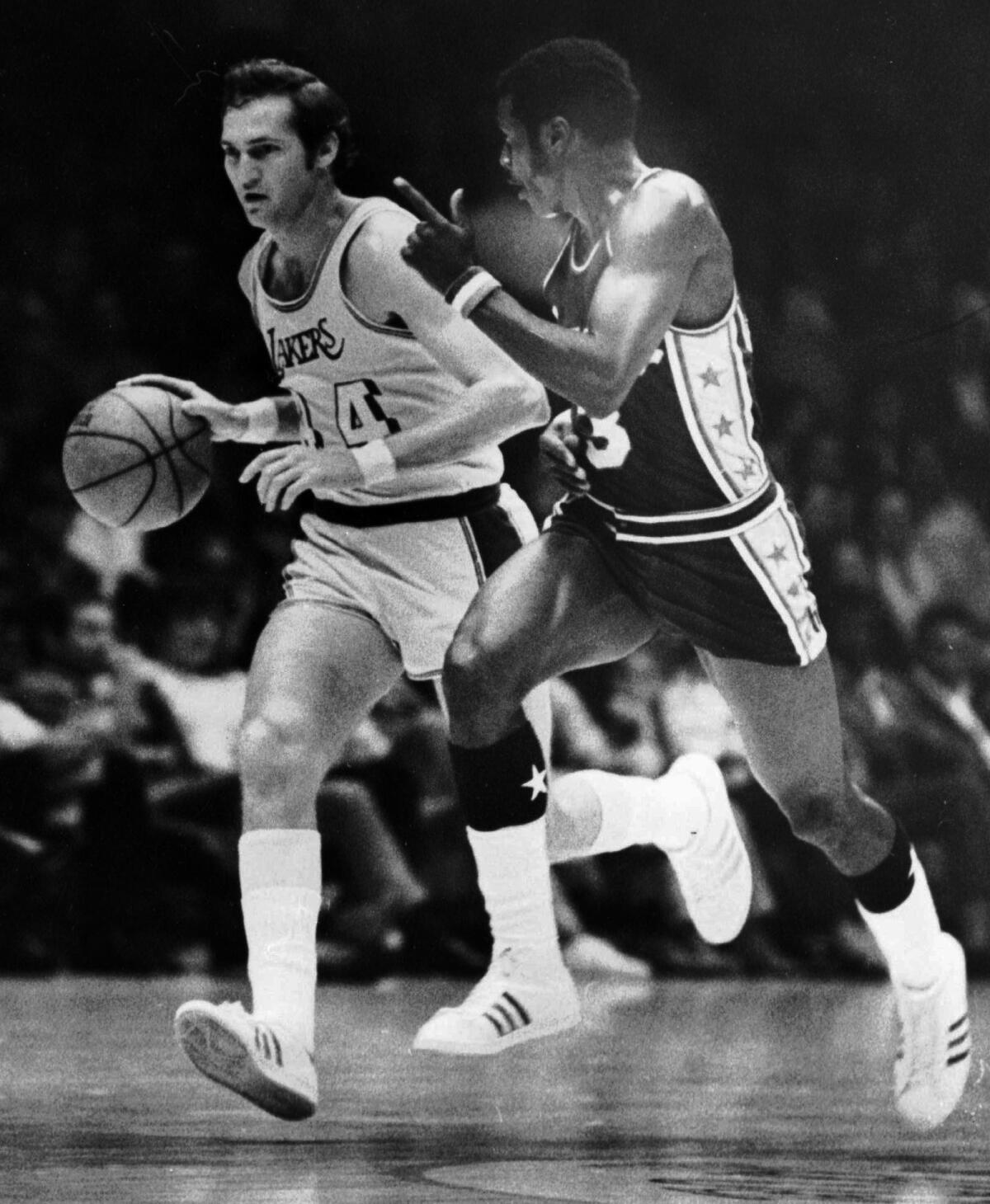
- Share via
The night started with the Christmas carol “It Came Upon the Midnight Clear” playing while a packed crowd at the Forum in Inglewood nervously wondered if they’d get to watch history happen.
Games in mid-December during the marathon of an NBA calendar rarely have stakes like this. But if the Lakers could win — something they had done 20 consecutive times before — they’d celebrate on the court with a ceremony and in the locker room with champagne.
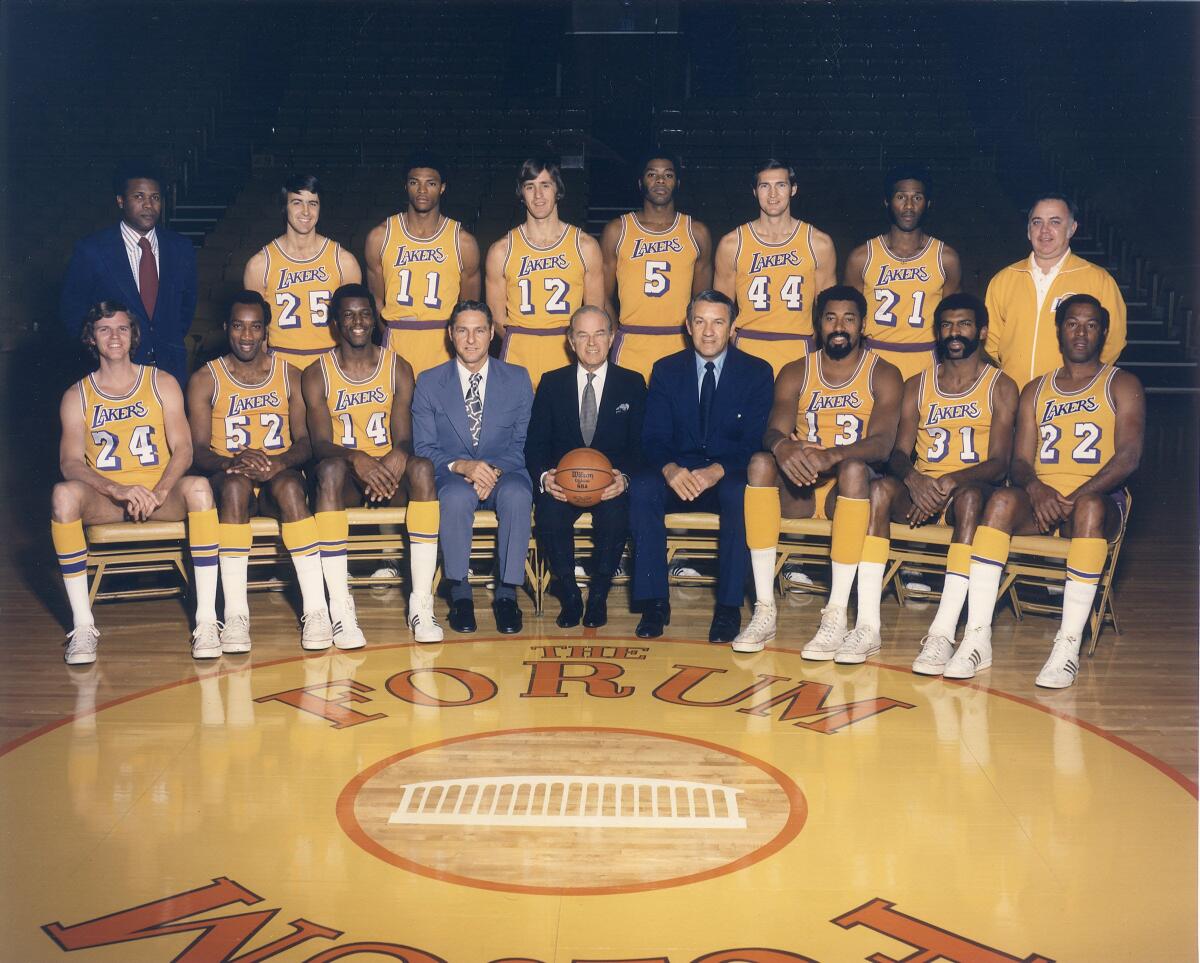
On Sunday, Dec. 12, 1971, the Lakers won their 21st consecutive game, setting the record for the longest winning streak in NBA history.
“I’m sure glad it’s over,” Wilt Chamberlain said that night.
Yet the Lakers’ winning streak wasn’t close to ending. And the record they set — the longest winning streak in team sports — is still standing 50 years later.
The Lakers would win 33 straight games, an unfathomable achievement that spanned the course of 65 days during the team’s magical championship season, the franchise’s first after relocating from Minneapolis in 1960.
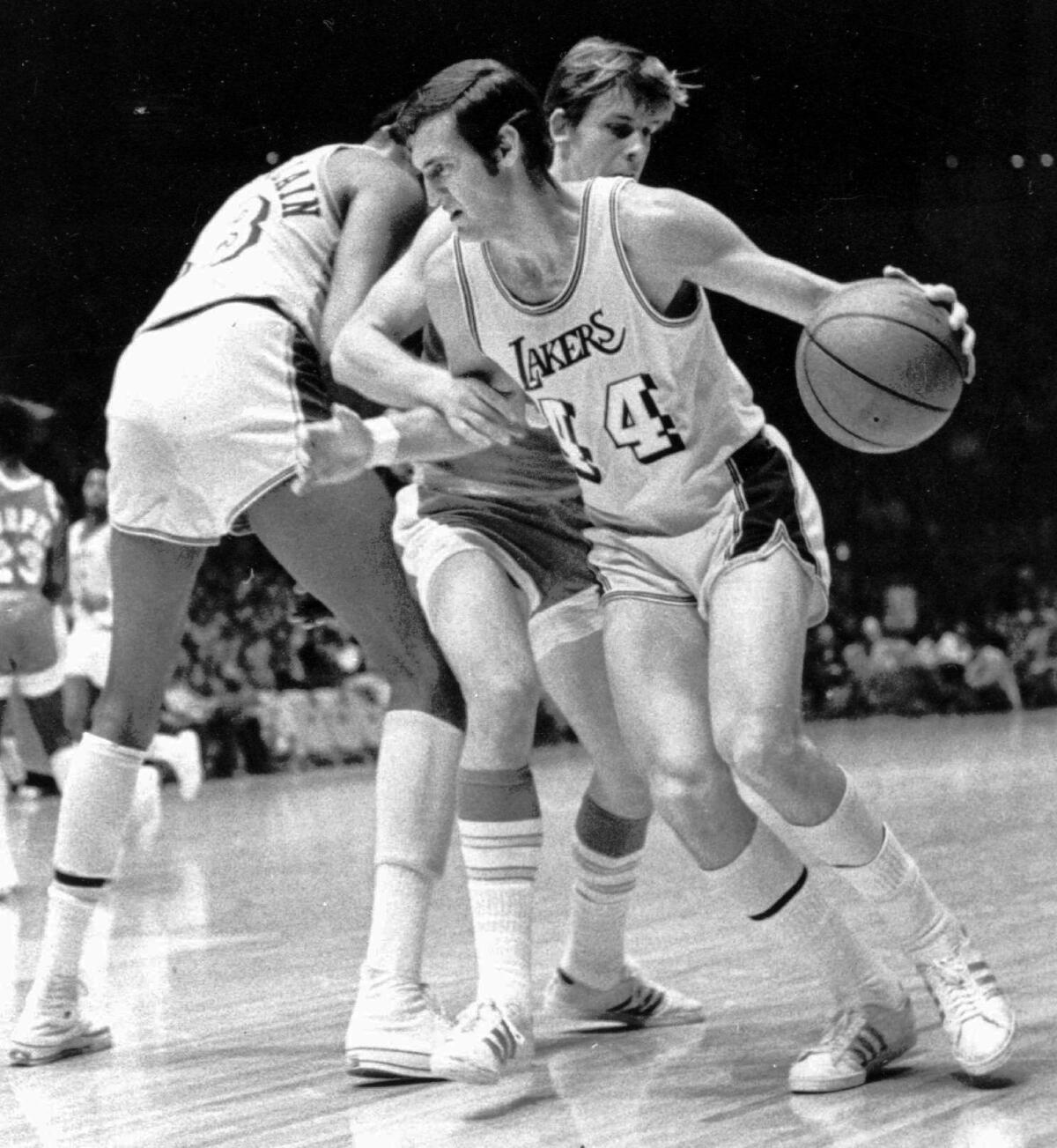
The Lakers scored 4,069 points during the streak, beating their opponents by an average of 16 points per game. Only one team, the Phoenix Suns, took them to overtime. And 24 times, opponents couldn’t keep the margin inside 10 points.
Chamberlain, Jerry West, Gail Goodrich, Pat Riley and Bill Sharman — the names on their own are legendary. But as part of the 1971-72 Lakers, they combined to create an accomplishment that’s still standing strong thanks to a combination of excellence, talent, time and place.
“If that 33-game winning streak at the time happened today with all the social media and coverage,” Riley, a backup guard on the team, told The Times, “it would be probably be almost unbearable to do.”
Riley should know. The Miami Heat team he helped assemble, with LeBron James and Chris Bosh joining Dwyane Wade, ripped off 27 consecutive wins in 2013. The Golden State Warriors pushed up against the fringes of the Lakers’ streak, winning 28 in a row over two regular seasons in 2015.
It hasn’t been close to being threatened since then.
“I’ll be honest. I don’t want to see it broken — at least during my lifetime,” said Jim Cleamons, a rookie on the Lakers’ 1971-72 team. “It’s like Joe DiMaggio. I don’t think anybody is going to beat his 56-game hitting streak, so I don’t want anybody to beat our 33-game winning streak. I’ll be honest about that. I don’t want to see it broken.
“I’m just sorry it wasn’t a little bit higher. I would have like to have really put it out there.”
All winning streaks before it and after it have started the same way — following a loss. But only the greatest streak in professional team sports could start with a loss like this.
Elgin Baylor wasn’t just a Laker at the time — he was the Lakers. He followed the team to Los Angeles from Minneapolis, bringing with him an electrifying style of play that would be mimicked by the NBA’s most exciting players for generations to come.
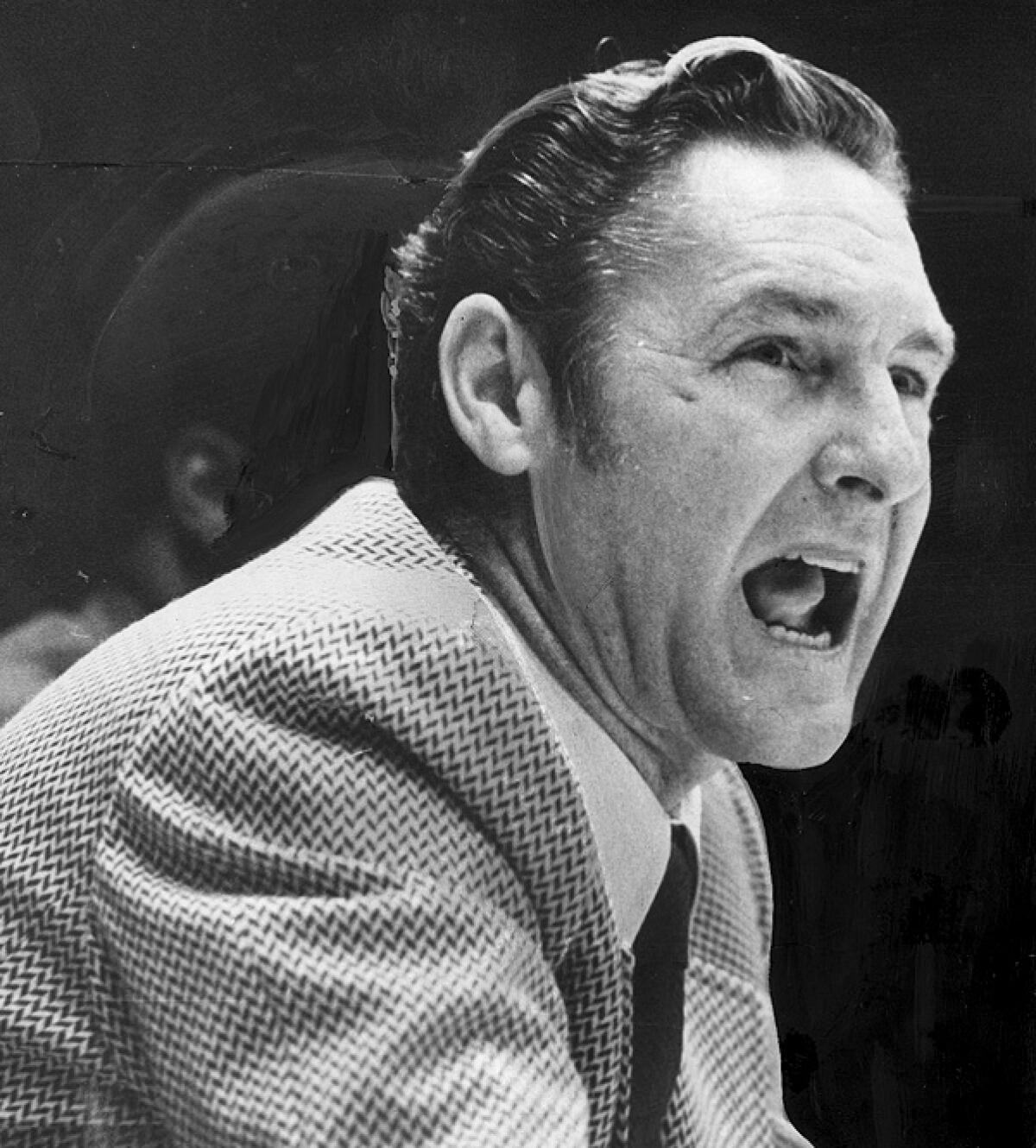
That version of Baylor was gone, an Achilles injury and achy knees slowing the Lakers’ most dynamic player to a crawl. Sharman, the Lakers’ new coach, wanted to make a change and move the 37-year-old Baylor out of the starting lineup.
Baylor, having played in only nine games before the winning streak began, instead retired. He made the decision after the Lakers lost to the Golden State Warriors by four points on Oct. 31, 1971.
“He was not getting the kind of results that he expected of himself,” Goodrich said. “When you’re that good — boy, he was that good — and you start to see your skills diminished a little bit. … And while you can still make a contribution, I think that, you know, his benchmark was so high for himself.”
It was hard to fathom, especially for West.
“My buddy, my friend, my cohort for so many years, I just sat there and said to myself, ‘How the hell is this going to be without him in the locker room?’ ” West remembered wondering. “It just was a shock for me. I had no clue, absolutely no clue that he was going to retire. None. I said, ‘What?’ when I heard about it. … How did this happen? Why?
“That’s why it was so shocking for him not to be there. But as I say, they don’t cancel school when a teacher leaves. So, they’re certainly not cancelling a basketball season, that’s for sure.”
For Sharman, it wasn’t the first time the team’s coach was in the midst of a challenge. Before he lost Baylor, he needed to first convince West to shoot less and distribute the ball more. Admittedly, that sell was easier than the other one he needed to make.

He needed to convince Chamberlain to wake up early.
Sharman was the inventor of the “shootaround” — a morning practice on game days designed to increase players muscle memory and focus before competition. It also meant an extra trip to the arena, with Chamberlain firing back that Sharman would see him at the Forum once per day — either for practice or the game.
Like the best jokes, it was full of truth.
But Sharman had Chamberlain’s respect from his time as Bob Cousy’s backcourt partner during the Boston Celtics’ dynasty. Sharman believed in work ethic, a tone he set during the team’s training camp in Hawaii.
After a lunch with Chamberlain, he got the Lakers center on board.
Like West, he also convinced Chamberlain — owner of another iconic record, his 100-point game — to sacrifice on offense to anchor the Lakers’ defense and rebounding, while playing quarterback for Sharman’s fast-break offense.
After Baylor’s retirement, Sharman turned to West and Chamberlain to be the team’s co-captains. West felt he’d play better without the responsibility, so Chamberlain took on the task alone, he wrote in his autobiography, “Wilt: Just like any other 7-foot black millionaire who lives next door.”
With Chamberlain as the captain and young Jim McMillian replacing Baylor in the starting lineup, the Lakers eased into their new reality with a tight win at home against the Baltimore Bullets.
“McMillian stepped in. He fit right in — a good quality scorer, a very, very good defensive player,” Goodrich said. “And so, at that point, you know, there was there was no drop off. And we were off.”
For 65 days and 33 games, the Los Angeles Lakers were unbeatable during the 1971-72 season. Here’s a look back at the winning streak 50 years later.
They wouldn’t lose again for more than two months.
Legendary Lakers broadcaster Chick Hearn narrated a record with highlights of the team’s 33 wins, praising the Lakers for catching their rhythm with a 40-point win in Philadelphia for their fifth consecutive victory.
“One of the best games in the history of the Lakers,” Hearn exclaimed that night.
If there were questions about Chamberlain’s buy-in to Sharman’s plan, he answered them against the Boston Celtics, managing to dominate despite scoring only three points in two shots and one trip to the free-throw line.
Chamberlain finished that win — the Lakers’ eighth in a row — with 31 rebounds, 10 assists and, according to Hearn, 13 blocked shots for one of the strangest triple-doubles in NBA history.
“It was pretty to watch, I’ll say that. It was pretty to watch,” West remembered. “Everyone shared in different ways. And I’ll never forget that before the season started, Bill Sharman asked me, he said, ‘I want you to lead the league in assists.’ I said, ‘I’ll try, if I can.’
“After my knee injury, I wasn’t the same player at all. I think I averaged almost 26 points a game even that way. But these games were easy because you just didn’t feel the pressure to score all the time and it got easier for us. Everyone had a role and they performed it.”
West and Chamberlain were the veterans. Goodrich was the scorer. McMillian provided the two-way support. Happy Hairston was a rebounding machine. Flynn Robinson, the team’s sixth man, could really shoot, and Riley was equally fearless and ferocious. John Trapp and Leroy Ellis reveled in the dirty work.
The Lakers kept piling up wins, even more impressively considering of how differently the NBA was scheduled in 1971-72. The winning streak began with victories on three straight nights. The first five games of the 33 were played in six days. The first eight wins? That happened in 10 days. Add in commercial travel the morning following games, and the physical demands were incredible.
“I think that’s a pretty incredible stat that the a lot of people don’t realize,” Goodrich said.
They fell into routines, Goodrich leaving the court after the same made shot before every game and West playing in the same sneakers throughout the run.
By the time the Lakers hosted the Atlanta Hawks on Dec. 12, people certainly realized the stakes. A win would break the Milwaukee Bucks’ record of 20 straight wins during their championship run the season before, immortalizing Sharman’s team. The fans counted down the final seconds before the 21st win in the streak.
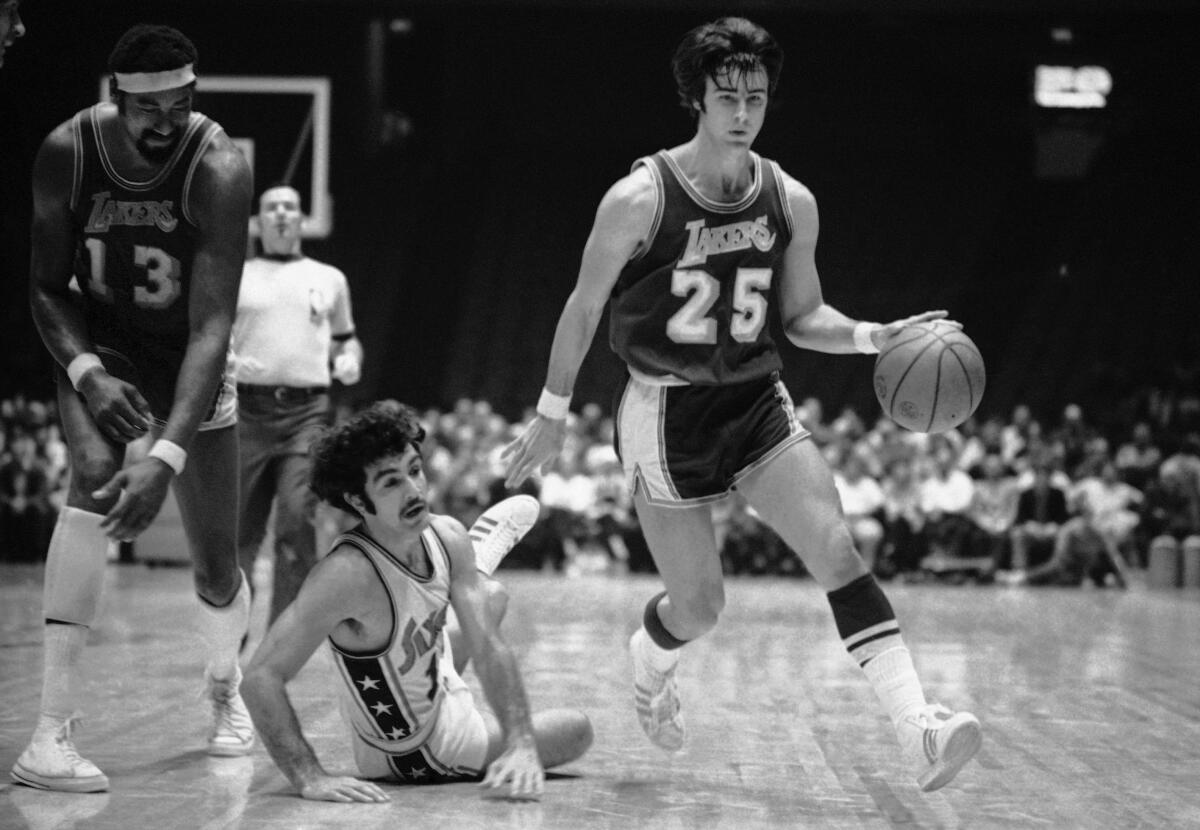
The postgame locker room was a wild scene, Hearn and partner Lynn Shackleford interviewing players while they celebrated.
“I believe this is the greatest thrill,” Sharman said.
Owner Jack Kent Cooke told Hearn he nearly suffered a heart attack as the Lakers desperately held on.
“But it was all worth it, wasn’t it?” he said to Hearn.
Ten days later in Baltimore, the Lakers got 37 points and nine assists from West to pass the 1916 New York Giants with 27 straight wins. Those Giants had won 26 without a loss, though there was a non-counting tie during their streak.
And in Atlanta on Jan. 7, the Lakers were as dominant as ever, making 58% of their shots while six players scored in double figures in a blowout win against Pete Maravich and the Hawks.
It was the team’s 33rd win in a row.
Two days later in Milwaukee against the defending NBA champions, the Lakers would finally lose 120-104.
“We went into the locker room after the game and it was over with, the 33 wins a row,” Riley said. “We got on a plane.”
The season would end with another victory that ended another streak: The Lakers finally won an NBA championship after losing seven finals in the first 11 years since moving to L.A. But the memory of the 33-game win streak would always linger.
“Some 2½ months without losing a game,” West said. “Pretty remarkable.”
More to Read
All things Lakers, all the time.
Get all the Lakers news you need in Dan Woike's weekly newsletter.
You may occasionally receive promotional content from the Los Angeles Times.




